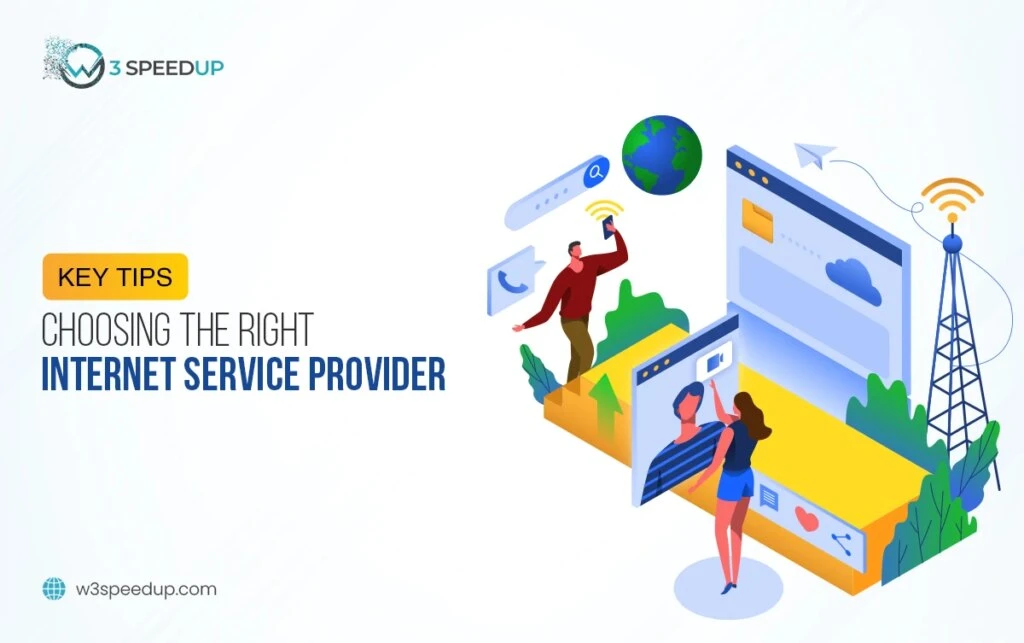Whether you are setting up your home or your office, choosing the right internet provider is important because it is a service you will use every day. From streaming movies and television to working from home, internet services provide access to everything you need on your devices. With lots of options to choose from, it will take some research to determine which internet service provider is best for you. Read below for some top tips to help you with your decision.
Key Factors for Selecting the Right Internet Service Provider
 Assess Your Internet Needs
Assess Your Internet Needs
Different internet users have different needs, so it is important to evaluate your internet usage before choosing an internet service provider. If you are getting the internet for your household, assess the amount of usage and the number of people in your family. If you have children in school who use the internet for homework and research and then go online to play games afterward, you will need an internet service that is fast and can cover multiple devices at once.
Additionally, if you work from home and are using the internet all day long, you will likely need an internet setup in your home office so that you always have reliable internet for video calls and other work activities. If you are getting the internet for your office building, then you will need a commercial internet service provider that has the bandwidth to cover several devices in the different rooms.
 Check Availability in Your Area
Check Availability in Your Area
Different areas of the country have different internet service providers, so remember to do research about your specific area to make sure you are getting a service that is well set up in that area. Do an internet search of Cincinnati’s fastest internet providers to find exactly which provider will work best in your neighborhood. From there, you can weigh the pros and cons of each local provider and decide which one fits best for your home or office.
 Understand the Different Types of Internet Connections
Understand the Different Types of Internet Connections
Once you have chosen a provider in your area, it is time to browse the different types of connections that they can set up for you.
01. Fiber Optic
This option has the fastest and most reliable connection but is mostly limited to densely populated and urban areas. If you live in a city or you have an office downtown, this is probably the best option for you. As the fastest option for internet, fiber optic internet provides download speeds of 1 GB per second or more.
02. Cable
Cable internet is widely available and more common in areas like the suburbs where there are a lot of neighborhoods. Although not as fast as fiber optic internet, cable still offers decent speeds from 25 Mb per second to 1 GB per second. This is a great option for households with family members who use the internet for all different reasons.
03. DSL
DSL, or digital subscriber line, is an older form of internet access that is not as commonly used now but is still a popular choice in rural areas where fiber optic and cable are not available. It is slower than fiber optic and cable as well but is well-suited to people who do not use the internet often like seniors. Average DSL speeds range from 1 to 100 Mb per second.
04. Satellite
Satellite internet is the last resort choice for people who have no other option. This usually means people who live in very rural communities like big farms where internet is not a priority. Although satellite does offer broad coverage for larger properties, it speeds tap out at about 25 to 100 Mb per second at the most.
 Consider Costs and Contracts
Consider Costs and Contracts
In addition to initial advertised prices, remember to also ask internet service providers about installation fees, equipment rental, and any other added fees that come with the internet service you want. You should also take the time to read the contracts that internet service providers give before signing them. This will help you have a better understanding of everything that comes with the service as well as give you information about warranties, customer service, and more.
 Watch Out for Data Caps and Usage Limits
Watch Out for Data Caps and Usage Limits
Some internet services have monthly data caps meaning that if you go over your data limit, you could encounter added fees or your service will be cut off for the rest of the month. Make sure that you are paying for enough internet service to last you and you family each month.
By evaluating your needs, checking availability, understanding the different internet options, and asking about costs and data limits you will be informed enough to make the right decision when it comes to choosing the right internet service provider.
 Christmas Mega Sale – Enjoy Up to 50% OFF on Every Plan!
Christmas Mega Sale – Enjoy Up to 50% OFF on Every Plan! 


